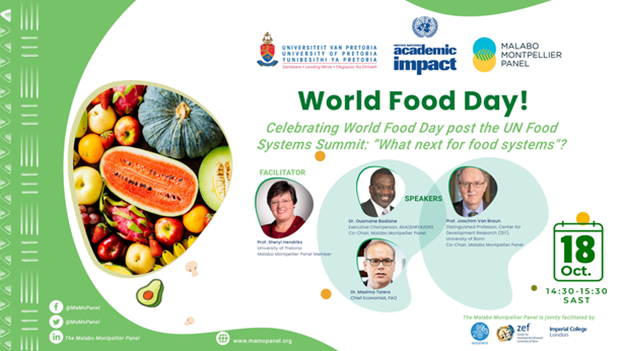Event Blog: Panel Discussion on ‘What’s next for food systems?’
10/22/2021

On the 18th of October 2021, the United Nations Academic Impact Hub for SDG 2 (hosted by the University of Pretoria) in collaboration with the Malabo Montpellier Panel hosted a panel discussion on “What’s next for food systems?”. This discussion follows the United Nations Food Systems Summit (UNFSS) that took place on 23 & 24 September 2021, at which stakeholders, ranging from farmers and business leaders to governments committed to transformation of the food system. The summit aimed to launch bold new actions to deliver progress on all 17 SDG’s, including SDG 2: Zero Hunger.
Prof Sheryl Hendriks, Head of the Department of Agricultural Economics, Extension and Rural Development at the University of Pretoria facilitated the discussion, opening the discussion with the comments, “Promises are one thing, moving to action is another ball game. There is still a lot to do beyond the food system summit”. These words introduced a fascinating discussion about what actions need to be taken now.
Prof Joachim von Braun who is the Chair of the UNFSS’s Scientific Group and Co- Chair of the Malabo Montpellier Panel spoke about the relationships between the environment and the food system. The different systems are connected and impact each other, which is why it was so important that the agenda of the summit extended beyond food, to system transformation. Prof von Braun explained the synergies and trade-offs that are evident when talking about transforming the food system. He also presented the findings from “The True Cost and True Price of Food” conducted by the UNFSS Scientific Group. According to the brief, currently, the value of food is not determined by how nutritious or sustainable it is. Instead, the value of food is determined by markets. The price of food does not reflect the value of food for society. Healthy food is relatively expensive, while unhealthy food is cheap. Prof von Braun also presented the seven priorities that the Scientific Group recommended for food system transformation, including investments into improving bioscience innovations and digital innovations to improve the inclusiveness of the food system and productivity. He also presented the practical steps for science that are needed for UNFSS including mapping the national food systems of all countries; identifying the relevant science, innovations and knowledge to address national concerns; integrating food system research policies into development policies and connecting national food systems with a global interface. The role of science and innovations will be critical in ensuring food system transformation, as Prof Von Braun explained.
Dr Ousmane Badiane who is the Co-Chair of the Malabo Montpellier Panel and Executive Director of AKADEMIYA2063 provided insight into the role of policy and institutions in moving the post-summit agenda forward. “Good policies are not the solution to everything, but I am convinced that bad policies are the cause of all problems”. The last twenty years has seen consistent economic growth in Africa, despite several crises that have hit the world. There is however much room for improvement and Dr Badiane explained how policies can help transform food systems to be more inclusive and better equipped to deal with problems. An example that he gave was that evidence-based policies need to be built on, perfected, and employed to help transform food systems with consistency and continuity. Policies require investment and time, so efforts need to be continued. Policy needs to be food-systems orientated, rather than agriculturally focused. Furthermore, Dr Badiane also said that productivity in Africa needs to be increased to stimulate growth, and science and innovation are one of the ways that this can be achieved. For him, the opportunities to transform the food system are endless, but will require serious commitment from various stakeholders including policymakers.
The final speaker of the discussion was Dr Maximo Torero who is the Chief Economist at the Food and Agriculture Organisation (FAO). He introduced a game that was developed by the FAO in response to the UNFSS, “Change the Game, Change the Future”. The game brings together the modern infrastructure that was developed for the summit to help anyone understand how interventions aimed at tackling specific challenges can have unintended consequences and trade-offs. The game focuses on one of the many challenges that are currently faced in the food system, food loss and food waste. The game blends insight, innovations and real-time data to show how policymakers in all countries can make the right decisions for interventions. The game will be launched in November, and will offer individuals and learning institutions with a wonderful tool for understanding the potential complexities and trade-offs in food system decisions.
The UN Food Systems Summit successfully ensured the prioritisation of food system transformation by world leaders who have committed to tackling global hunger, climate change and biodiversity loss. The summit also championed equity and inclusion of all stakeholders who will need to be involved in transforming food systems. Agreements and promises have been made, and it is now time for action to be taken.
Becoming an agent of change is not limited to policymakers and business leaders. As suggested by the panellists, engaging with different stakeholders on the ground leads to learning and teaching, which enhances the understanding of all of us. The panellists that participated in this discussion outlined some of the steps that will be required in achieving food security for all, and each of us has a role to play in transforming food systems, as researchers, as consumers, and as the people of the world.
If you missed the discussion, you can watch the recording here.
